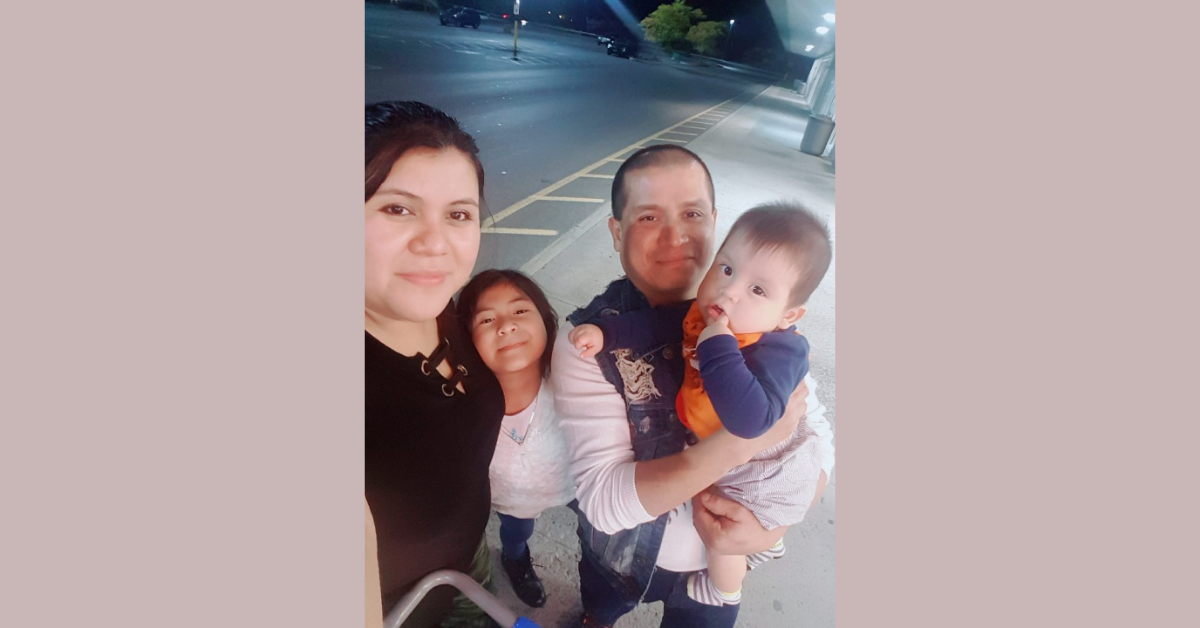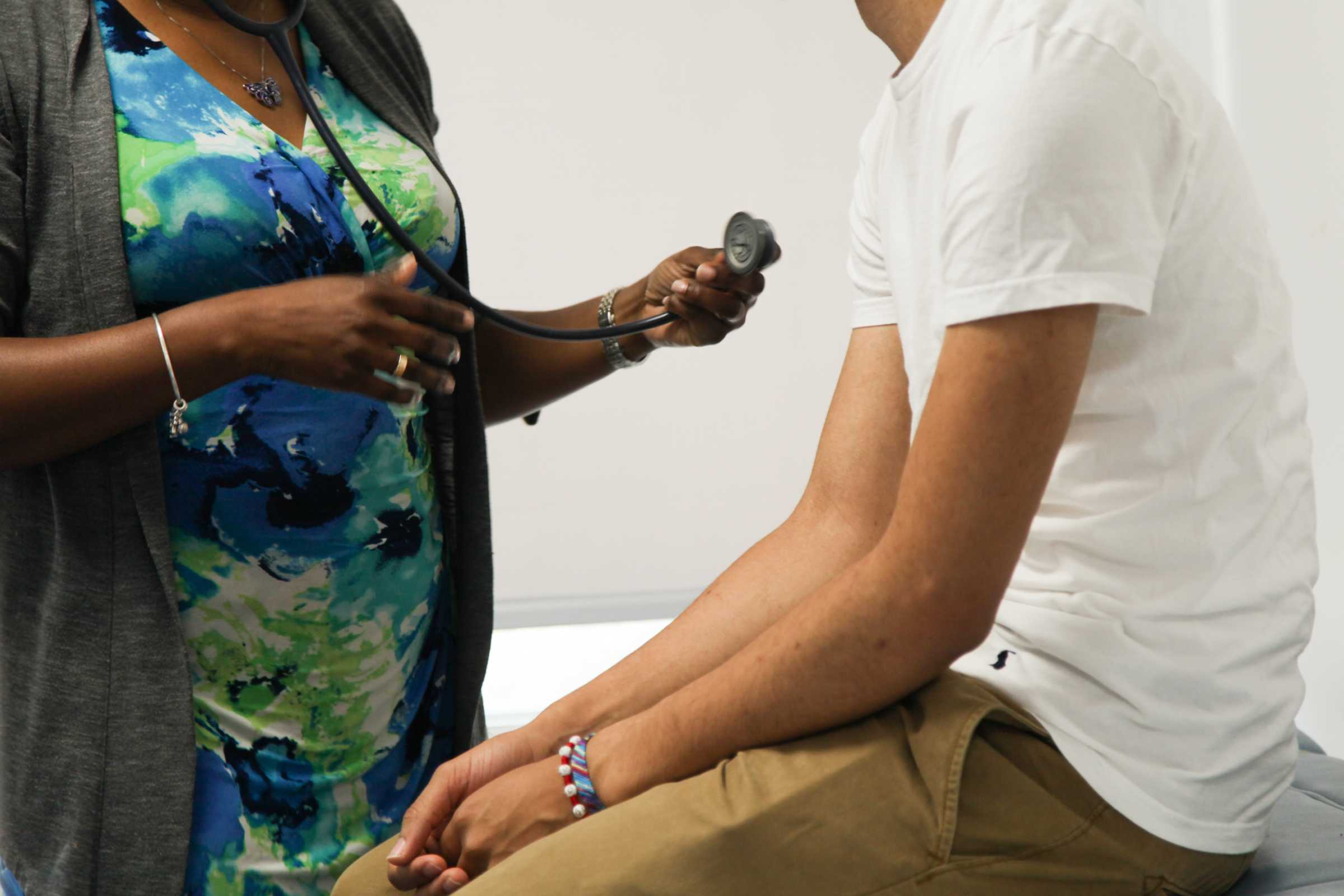On Friday, April 8, 42-year-old Pedro Joj took a break from milking cows to walk home for Tylenol. He was feeling dizzy and had a headache. Soon after, his nine-year-old step-daughter found him convulsing on the ground at the dairy farm. He died four days later at St. Luke’s Hospital in Utica, New York, after being taken off life support.
About a week before Joj’s death, he suffered a blow to his head from a heavy door on the farm. According to his wife Marlene Chial-Yac, after the injury, he complained of headaches that eventually subsided. Joj, like many farm workers who are injured on the job, did not report it to his supervisor, Matt Rapasadi.
Joj worked on a small dairy farm in Verona, New York. Chial-Yac said Joj did every task with the cows: feeding, cleaning, milking, bedding, injecting antibiotics, and birthing. She said he had been working 11-to-12-hour days, seven days a week, receiving a weekly wage of $620 — roughly $7.70 an hour — and a pizza. New York’s upstate minimum wage was $12.50 an hour in 2021 and is $13.20 an hour in 2022. For the 15 months he worked, we estimate Joj was underpaid by about $28,500.
This type of farm worker abuse is not uncommon on farms, according to a 2020 report by the Economic Policy Institute. Legal status also plays a role; an analysis of government data shows higher rates of wage theft in industries reliant on undocumented workers, such as agriculture.
The couple assumed that Joj was underpaid, but didn’t complain as they were grateful for the housing. In the four years they were together, they had been forced to live apart twice while Joj was in male-only farm housing.
Also Read: 12 Workers Make History Forming New York’s First Farm Workers Union
Joj and Chial-Yac first met on Facebook. Joj, who was previously married and had an adult son, was living in the U.S. and Chial-Yac in Guatemala. After a few months, he asked her to be his girlfriend. Having never seen his photo, she was nervous to say yes. They scheduled a video call, and Chial-Yac, charmed by Joj, agreed. After three years of a virtual relationship, Chial-Yac moved to the U.S. with her younger daughter to be with Joj. In 2020, they had a son together.
Chial-Yac described Joj as a loving father and husband who treated her daughter as his own. “He was a very responsible worker, always trying to keep his boss happy. On his days off, he liked to be with his kids. We would go to the store all together, and he always liked to joke around. When there were problems, he was always very patient,” she said.
Undocumented immigrants fear their bosses could retaliate against them for officially reporting injuries, explained Beverly Sirvent of Finger Lakes Community Health, a New York-based multilingual health center. She shared that in her experience, farm workers avoid reporting injuries primarily because “they think that the farm owner will blame them for the injury and fire them.” Sirvent also pointed out that farm workers fear being reported to immigration authorities.
Applying for workers’ compensation requires a lawyer and undocumented immigrants, having spent thousands of dollars in legal fees for immigration attorneys, only to see nothing in return, tend to be wary of lawyers. Chial-Yac reported spending $2,000 on one who stopped responding to her calls.
Also Read: Two Immigrants Sue New York Employer Over Dangerous Farm Workers Housing
Jessica Maxwell, the executive director of Workers Center of Central New York said, “The culture on farms is rooted in family, not business. So workers are disincentivized from going through legal proceedings, particularly when their employer tells them they will pay for the hospital bill.” But, Maxwell explained, if the initial injury leads to a secondary one or has residual effects, it is difficult to apply for workers’ compensation at that point.
On his last day at the farm, Joj left for his first shift before sunrise. Chial-Yac woke soon after to prepare tamales, his favorite meal. She had planned a trip to take her children to her brother’s home to celebrate her nephew’s birthday, but ”something inside me said not to leave,” Chial-Yac told Documented. “Thanks to God I didn’t, otherwise he would have died alone,” she continued.
When her daughter ran home to tell her mom about Joj’s convulsion, Chial-Yac rushed to him. Another worker on site called an ambulance. Joj regained consciousness and tried to speak, but could not. Chial-Yac told him to stay calm, that he would be OK. Initially, Joj’s supervisor agreed to drive Chial-Yac to the hospital since she was not allowed to ride in the ambulance. According to Chial-Yac, Rapasadi instead sent another worker with $70 for her to pay for a ride. It was late and she couldn’t find one.
Chial-Yac arrived at the hospital at 6 a.m. the next day, only to find that the hospital staff had no record that Joj was there. She spent hours trying to locate him, imagining him dead. Eventually she discovered that the hospital had spelled Joj’s last name wrong. It wasn’t until 4 p.m. on April 9 that Chial-Yac was by Joj’s side. He was in a coma.
On April 12, Joj was declared brain dead. Joj’s adult son had also visited the hospital. The doctors encouraged Chial-Yac and Joj’s son to take Joj off life support and donate his organs; they agreed. On April 21, Joj was buried in Prospect, New York.
A 2014 study found that the U.S. government failed to identify about three-fourths of nonfatal injuries on farms due to employer negligence or “willful underreporting” by employers or employees.
New York’s 2019 Farm Laborers Fair Labor Practices Act (FLPA) has attempted to address the underreporting by requiring farm owners, contractors, and supervisors to report farm injuries. Lisa Zucker, a senior attorney at the New York Civil Liberties Union, said that the reporting amendment was made “as a recognition that for various reasons — fear, intimidation, language access, etc. — many farm workers will be unable or unwilling to officially report an injury.”
Despite the state legislation, federal rules make it difficult for workers’ families to request an investigation into fatalities on small farms. By statute, the jurisdiction of the Occupational Safety and Health Administration (OSHA) covers all farms. However, every year since 1976, Congress has passed a rider to the Appropriations Act that prohibits OSHA from enforcement activities, including investigating fatalities, on smaller farms — defined as having ten or fewer workers.
Also Read: Restaurant Workers Struggle to Recover Wages Stolen During the Pandemic
“Farm workers find it so hard to trust,” said Angie Hernandez, an organizer with Trabajadores Agrícolas Unidas, a coalition of unions organizing New York’s farm workers. Hernandez, a former farm worker, is one of several advocates helping Chial-Yac navigate her and her children’s lives after Joj’s death. Reflecting on the countless workers she has met who have been injured and not pursued workers’ compensation, or even medical care, Hernandez added, “We should be embarrassed.”
When Chial-Yac returned to the farm to collect her belongings, she found a new couple in her home. The couple told her they had been asked to clean the trailer and suspected that Rapasadi had disposed of her possessions. Chial-Yac reports that she heard the new couple already left the farm, claiming the work was too much for one person and not worth the minimal pay.
Farm workers living in employer-provided housing have the same rights as tenants; they and their belongings cannot be removed without a court order. Eventually Chial-Yac did get most of her belongings back, but none of her kitchen supplies, nor the groceries from their weekly run, the day before Joj was hospitalized. It cost the couple $60 just for the ride to and from the grocery store, almost 10 percent of his weekly salary.
Rapasadi did not respond to our calls for a comment. According to Chial-Yac, he did not visit the hospital, attend Joj’s funeral, or offer condolences.
Based on property records and Joj’s bank deposits, from “Louis Mario &.”, it appears the farm is run by Louis DeMario & Sons LLC (a farm operation that includes dairy). Calls to the business were never returned. A May 1 Facebook post read: “Mark & Matt Rapp and crew working on Sunday to get those dam onions in the ground for DeMario Farms” with links to Matt Rapasadi and Greg DeMario, which indicates that the Rapasidis work for DeMario & Sons LLC. Joj did not receive paystubs and it is not uncommon for farmworkers to not know the name of their employer or even the town where they work.
Chial-Yac remains nervous about involving lawyers and is even considering leaving the state. Her two-year-old son constantly asks where his father is, guessing he’s at work “with the cows”. Her daughter has nightmares most nights about finding Joj on the ground.















